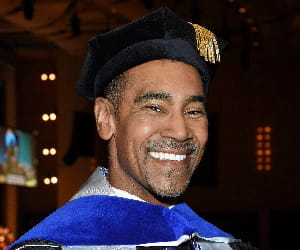
Despite some students’ feelings about learning mathematics, research shows that math achievement can actually be a predictor of success in school and beyond graduation.
“Middle school is a critical time in students’ learning of math,” says Dr. Vaughn Bradley, a 2018 PhD in Education graduate and assistant principal in the Montgomery County Public Schools system in Maryland. “That’s why I wanted to understand how parents of middle schoolers can use a learning management system (LMS) to support their children in math.”
Montgomery County schools began using different types of LMS platforms in 2006, with the initial intent of allowing students to check their grades. Building on that access, Dr. Bradley wondered if LMS platforms could be a better tool for parents to keep an eye on their children’s progress. This could include providing a supportive environment that promotes positive conversation between parents and students, which can build independence and instill confidence in a challenging and important area of study.
Dr. Bradley began his doctoral journey at Walden University, having already accumulated a decade of experience teaching science to seventh and eighth graders and moving into a school administration position. During that time period, smartphones and tablets were being introduced to the masses. The concept of incorporating technology into the classroom intrigued him.
“I was on a leadership track to become a principal after receiving my master’s in supervision and administration,” recalls Dr. Bradley. “I spoke with an associate superintendent who asked about my goals and aspirations because she wanted to know if I was working on a doctoral degree. Before then, I honestly hadn’t given it much thought. She encouraged me to be a lifelong learner and just keep going.”
Inspired by the new wave of technology and support from his colleague, Dr. Bradley decided to search for a reputable doctoral program that supported its students. He came across Walden and was attracted to the university’s mission of positive social change.
“Initially, I was really surprised by the high expectations and rigor of the doctoral program. I remember my first residency, which kicked me into high gear because I was able to meet one-on-one with faculty and listen to students who were preparing their proposals or about to defend their dissertations. When they started to talk about their research, their passion and enthusiasm inspired me to fully commit and pursue this doctoral degree with everything I had.”
With advancements in technology and LMS platforms, he finds teachers are now uploading tutorial videos for their students, and parents are watching so they can support their child, understand Common Core, and learn new ways of doing math. Although parents are able to access more resources than ever before, Dr. Bradley says there is still room to grow since some teachers are only uploading the bare minimum, making it difficult for the tool to be used to its full capacity.
“We have to focus on how we’re training teachers to use the tools they are given for instruction, which is why I’m interested in returning to the classroom to teach in a higher education setting,” says Dr. Bradley. “Earning a doctoral degree is a big deal. I learned so much as a Walden student and would love to apply it in the college setting to ensure educators learn how technology can be used to support student success.”
—Jen Raider



